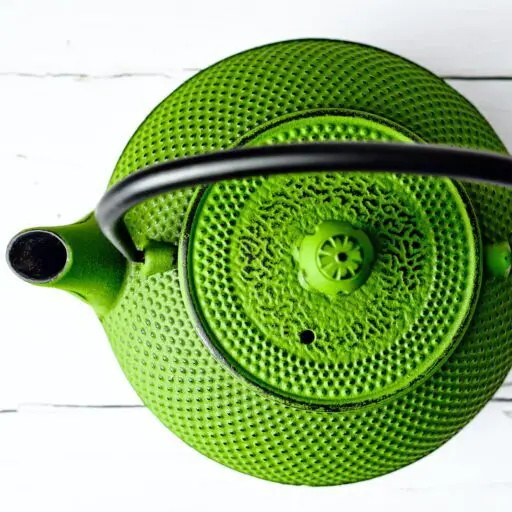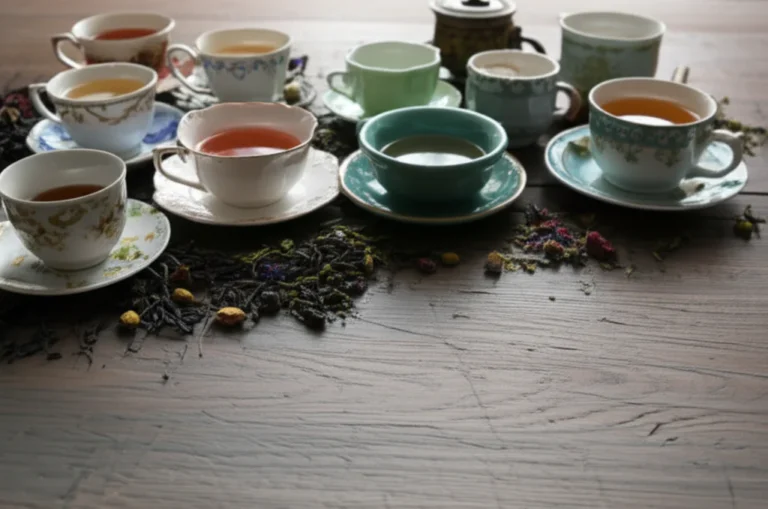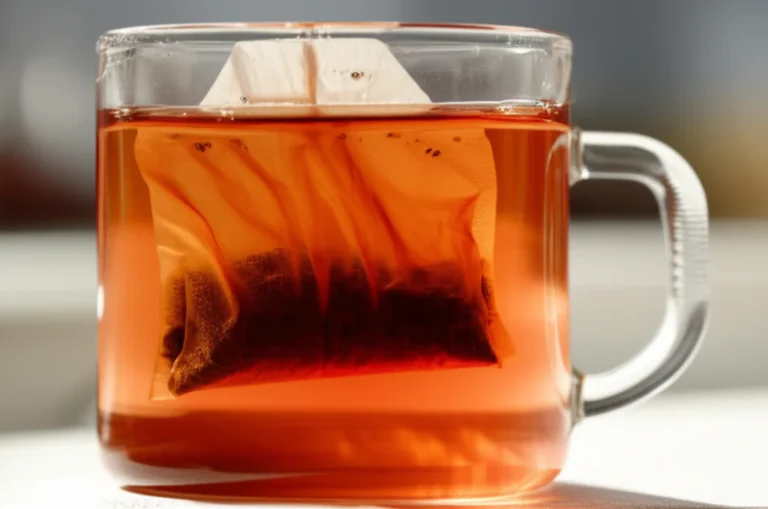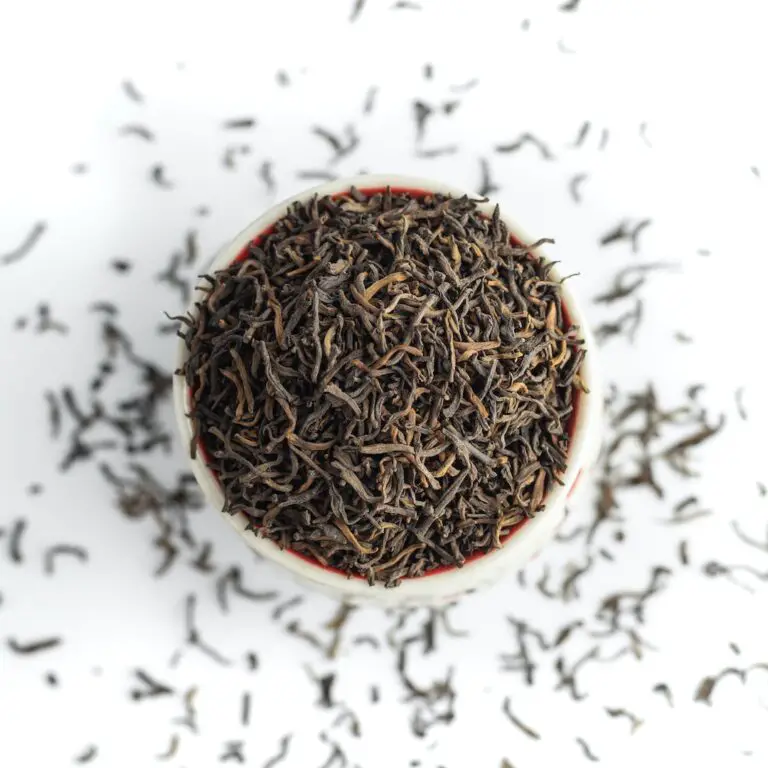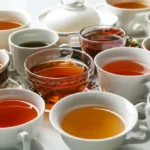Support our educational content for free when you purchase through links on our site. Learn more
What Is the Most Popular Tea Flavor in the World? Top 10 Revealed! 🍵 (2025)
Ever wondered which tea flavor holds the crown as the world’s favorite? Is it the bold and robust English Breakfast, the fragrant and citrusy Earl Grey, or perhaps the spicy warmth of Masala Chai? As expert tasters at Tea Brands™, we’ve journeyed through mountains, markets, and teahouses to uncover the top 10 most popular tea flavors enjoyed across the globe. Spoiler alert: the answer might surprise you, especially once you see how culture, history, and health trends shape our daily cuppa.
From the misty Darjeeling hills to the bustling streets of Mumbai, tea flavors tell stories of tradition, innovation, and pure deliciousness. Stick around as we dive into each flavor’s unique profile, share insider brewing tips, and reveal which blends are winning hearts (and mugs) worldwide. Plus, we’ll spill the tea on how to pick your next favorite brew based on your taste and lifestyle. Ready to steep yourself in tea wisdom? Let’s get started!
Key Takeaways
- Black tea varieties dominate global consumption, with blends like English Breakfast and Darjeeling leading the pack.
- Flavor popularity is deeply influenced by cultural traditions and health trends, making tea a personal and regional experience.
- Spiced blends like Chai and citrus-infused Earl Grey offer versatile, aromatic options that appeal to many palates.
- Green and white teas are prized for their delicate flavors and antioxidant benefits, while herbal infusions like turmeric tea are rising stars in wellness circles.
- Perfect brewing techniques unlock the full potential of each tea flavor—temperature and steeping time matter more than you might think!
Curious to know which tea flavor truly reigns supreme and how to brew it like a pro? Keep reading for our expert insights and top brand recommendations!
Table of Contents
- ⚡️ Quick Tips and Facts About the Most Popular Tea Flavors
- 🌱 The Rich History and Global Journey of Tea Flavors
- 🍵 Understanding Tea Types: From Black to Herbal and Beyond
- 🌍 The World’s Favorite Tea Flavors: A Global Taste Test
- 1. Darjeeling: The Champagne of Teas
- 2. Chai: The Spiced Symphony from India
- 3. Earl Grey: The Bergamot Classic
- 4. English Breakfast: The Robust Morning Brew
- 5. Green Tea: The Antioxidant Powerhouse
- 6. Matcha: The Vibrant Japanese Supertea
- 7. Oolong: The Artful Balance of Flavor
- 8. Ceylon: The Bright and Citrusy Delight
- 9. White Tea: The Delicate and Subtle Treasure
- 10. Turmeric Tea: The Golden Health Elixir
- 🌿 Is Tea Vegan and Allergen-Friendly? What You Need to Know
- 💪 Health Benefits of Popular Tea Flavors: Myth vs. Science
- ☕️ Brewing the Perfect Cup: Tips for Unlocking Flavor
- 🌟 How Cultural Preferences Shape Tea Popularity Worldwide
- 📊 Consumer Insights: What Tea Lovers Really Crave
- 🔍 Expert Recommendations: Choosing Your Next Favorite Tea Flavor
- 🎉 Fun Facts and Anecdotes from Our Tea Tasting Team
- 📝 Conclusion: What Makes a Tea Flavor Truly Popular?
- 🔗 Recommended Links for Tea Enthusiasts
- ❓ FAQ: Your Burning Questions About Popular Tea Flavors Answered
- 📚 Reference Links and Further Reading
Hello, fellow tea lovers! We’re the expert tasters at “Tea Brands™,” and we live and breathe everything tea. Today, we’re diving deep into a question that sparks endless debate in cafes and kitchens worldwide: What is the most popular tea flavor in the world? Is it the robust punch of a classic black tea or the delicate whisper of a floral blend? Let’s get the kettle on and find out!
⚡️ Quick Tips and Facts About the Most Popular Tea Flavors
Pressed for time? Here’s the tea, straight up.
- The Reigning Champion: Globally, black tea is the undisputed king, accounting for about 75% of all tea consumption.
- Flavor vs. Type: It’s crucial to distinguish between a “type” of tea (like black, green, or oolong, which all come from the Camellia sinensis plant) and a “flavor,” which can be a specific regional tea (like Darjeeling) or a blend (like Earl Grey).
- Top Contenders: The most famous and beloved tea flavors include classics like English Breakfast, Earl Grey, Chai, and Green Tea.
- Health is Wealth: Many popular teas are packed with antioxidants and offer various health benefits, from boosting heart health to aiding digestion.
- It’s All in the Brew: The flavor of your tea is massively influenced by water temperature and steeping time. A few seconds can be the difference between bliss and bitterness!
- Vegan-Friendly? ✅ Mostly, yes! Pure tea is 100% plant-based. Just watch out for blends that add honey or dairy.
🌱 The Rich History and Global Journey of Tea Flavors
Tea’s story is as rich and complex as a first-flush Darjeeling. It all began thousands of years ago in China, with the Camellia sinensis plant. Initially used for medicinal purposes, it was during the Tang Dynasty that tea truly became a beloved recreational drink, spreading across East Asia.
The journey of tea to the West was a game-changer. Portuguese priests and merchants first introduced it to Europe in the 16th century. But it was the British who fell head over heels, transforming it into a national obsession. They started large-scale tea plantations in India and Sri Lanka (then Ceylon), giving birth to some of the world’s most iconic black teas. This historical trade and cultural adoption are why black tea remains the most consumed type globally today.
🍵 Understanding Tea Types: From Black to Herbal and Beyond
Before we can crown the most popular flavor, let’s clear something up. All “true” teas come from a single plant: Camellia sinensis. The incredible diversity in flavor, color, and aroma comes down to one crucial factor: oxidation. This is the process where the tea leaves are exposed to air, causing them to darken and develop deeper flavors.
Here’s a handy table to break it down:
| Tea Type | Oxidation Level | Key Characteristics | Popular Examples |
|---|---|---|---|
| White Tea | Minimal | Delicate, subtle, naturally sweet, and light. | Silver Needle, Bai Mudan |
| Green Tea | Unoxidized | Grassy, vegetal, sometimes nutty or sweet. | Sencha, Matcha, Longjing |
| Oolong Tea | Partially Oxidized | The most complex; can range from light and floral to dark and roasted. | Tieguanyin, Da Hong Pao |
| Black Tea | Fully Oxidized | Strong, robust, malty, and sometimes fruity. | Assam, Darjeeling, Ceylon |
| Pu’erh Tea | Fermented & Aged | Deep, earthy, rich, and smooth. | Sheng (Raw), Shou (Cooked) |
What about things like Chamomile, Peppermint, or Rooibos? Those are technically herbal infusions or tisanes, as they don’t come from the Camellia sinensis plant. We love them just the same, and you’ll find some herbal heroes like Turmeric tea on our list for their sheer popularity! For a deeper dive, check out our Herbal Tea guides.
🌍 The World’s Favorite Tea Flavors: A Global Taste Test
So, which specific flavors have captured the hearts and mugs of the world? While it’s tough to find the single world’s best tasting tea, these ten consistently top the charts. We’ve rated them based on our team’s extensive tasting experience.
1. Darjeeling: The Champagne of Teas
Hailing from the misty mountains of West Bengal, India, Darjeeling is revered for its unique and complex flavor. It’s a black tea, but it’s so light and aromatic that it stands in a class of its own.
Our Taster’s Rating:
| Aspect | Rating (1-10) |
|---|---|
| Flavor Complexity | 10/10 |
| Aroma | 9/10 |
| Versatility | 7/10 |
| Caffeine Kick | 7/10 |
It’s often called the “champagne of teas” for its distinctive muscatel grape notes, with floral and fruity undertones. The flavor can vary dramatically depending on the harvest “flush” (First Flush, Second Flush, etc.). We recommend trying it without milk first to appreciate its delicate character.
- Top Brand Pick: VAHDAM® Teas is renowned for its authentic, single-estate Darjeelings, sourced directly from India.
👉 Shop VAHDAM® Darjeeling on:
2. Chai: The Spiced Symphony from India
Properly known as Masala Chai, this isn’t just a tea; it’s an experience. It’s a blend of strong black tea, milk, a sweetener, and a heady mix of aromatic spices like cardamom, cinnamon, ginger, and cloves.
Our Taster’s Rating:
| Aspect | Rating (1-10) |
|---|---|
| Flavor Complexity | 9/10 |
| Aroma | 10/10 |
| Versatility | 8/10 |
| Caffeine Kick | 8/10 |
Chai is a hug in a mug! The warming spices are a perfect counterpoint to the robust black tea. As the video on global teas mentions, Masala Chai is an aromatic and fragrant staple in India. [cite: #featured-video] It’s incredibly versatile and can be made into a latte, served iced, or even used in baking.
- Top Brand Pick: Tazo makes a fantastic and widely available Chai concentrate that’s a perfect balance of sweet and spicy.
👉 Shop Tazo Chai on:
3. Earl Grey: The Bergamot Classic
Ah, Earl Grey. This quintessentially British blend is a black tea flavored with the oil of bergamot, a citrus fruit that tastes like a cross between an orange and a lemon with a hint of grapefruit.
Our Taster’s Rating:
| Aspect | Rating (1-10) |
|---|---|
| Flavor Complexity | 8/10 |
| Aroma | 10/10 |
| Versatility | 9/10 |
| Caffeine Kick | 8/10 |
Its distinctive floral and citrusy aroma is instantly recognizable. It’s a sophisticated yet comforting brew, traditionally served with a slice of lemon. We love its versatility—it’s fantastic hot, makes a refreshing iced tea, and even appears in cocktails and desserts.
- Top Brand Pick: Twinings is credited with first creating this blend, and their version remains the gold standard for many tea drinkers.
👉 Shop Twinings Earl Grey on:
4. English Breakfast: The Robust Morning Brew
If you need a tea to kickstart your day, this is it. English Breakfast is a full-bodied, rich blend of black teas, typically from Assam, Ceylon, and Kenya.
Our Taster’s Rating:
| Aspect | Rating (1-10) |
|---|---|
| Flavor Complexity | 7/10 |
| Aroma | 8/10 |
| Versatility | 10/10 |
| Caffeine Kick | 9/10 |
It’s designed to be strong and robust, standing up well to milk and sugar. This is the dependable workhorse of the tea world—hearty, satisfying, and always there for you. It’s the perfect companion to a full breakfast, hence the name!
- Top Brand Pick: Bigelow offers a classic English Breakfast that is both rich and smooth, a favorite in many American households.
👉 Shop Bigelow English Breakfast on:
5. Green Tea: The Antioxidant Powerhouse
Shifting gears from black teas, Green Tea is celebrated not just for its flavor but for its incredible health benefits. Because the leaves are not oxidized, they retain their green color and a high concentration of beneficial compounds like EGCG.
Our Taster’s Rating:
| Aspect | Rating (1-10) |
|---|---|
| Flavor Complexity | 8/10 |
| Aroma | 7/10 |
| Versatility | 8/10 |
| Caffeine Kick | 5/10 |
The flavor profile is typically fresh, grassy, and slightly sweet, though it can range from buttery to smoky depending on whether it’s steamed (Japanese style) or pan-fired (Chinese style). Be careful with brewing! Using water that’s too hot or steeping for too long will result in a bitter taste.
- Top Brand Pick: Yogi Tea makes a popular Green Tea Super Antioxidant blend that is both flavorful and wellness-focused.
👉 Shop Yogi Green Tea on:
6. Matcha: The Vibrant Japanese Supertea
Matcha is a special type of green tea where shade-grown leaves are finely ground into a powder. Instead of steeping the leaves, you whisk the powder into water, meaning you consume the entire leaf!
Our Taster’s Rating:
| Aspect | Rating (1-10) |
|---|---|
| Flavor Complexity | 9/10 |
| Aroma | 8/10 |
| Versatility | 10/10 |
| Caffeine Kick | 9/10 |
It has a smooth, rich, and slightly grassy flavor with a lingering sweet aftertaste. Its vibrant green color is a sign of high quality and chlorophyll content. As seen in our featured video, it’s traditionally whisked into a frothy broth and has become a global sensation in lattes, smoothies, and desserts.
- Top Brand Pick: Ito En is a respected Japanese brand that offers high-quality matcha for both traditional preparation and culinary uses.
👉 Shop Ito En Matcha on:
7. Oolong: The Artful Balance of Flavor
Oolong is the master of the in-between. It’s semi-oxidized, falling somewhere between green and black tea. This makes it one of the most complex and diverse tea categories.
Our Taster’s Rating:
| Aspect | Rating (1-10) |
|---|---|
| Flavor Complexity | 10/10 |
| Aroma | 9/10 |
| Versatility | 7/10 |
| Caffeine Kick | 6/10 |
Flavors can range from light, creamy, and floral (like a “Milk Oolong”) to dark, roasted, and fruity. One of the best things about oolong is that the leaves can often be steeped multiple times, with each infusion revealing a new layer of flavor.
- Top Brand Pick: The Republic of Tea has a wonderful selection of oolongs, including their popular Milk Oolong.
👉 Shop The Republic of Tea Oolong on:
8. Ceylon: The Bright and Citrusy Delight
Ceylon tea is a black tea produced in the highlands of Sri Lanka. It’s known for its bright, crisp, and bold flavor.
Our Taster’s Rating:
| Aspect | Rating (1-10) |
|---|---|
| Flavor Complexity | 7/10 |
| Aroma | 8/10 |
| Versatility | 9/10 |
| Caffeine Kick | 8/10 |
It often has notes of citrus and spice, making it incredibly refreshing. It’s a key component in many English Breakfast and Earl Grey blends, but it shines on its own, especially as an iced tea.
- Top Brand Pick: Dilmah is a Sri Lankan family tea company that is famous for its single-origin Ceylon teas.
👉 Shop Dilmah Ceylon Tea on:
9. White Tea: The Delicate and Subtle Treasure
White tea is the least processed of all true teas. Made from the young, unopened buds of the tea plant, it has a delicate, subtle, and naturally sweet flavor.
Our Taster’s Rating:
| Aspect | Rating (1-10) |
|---|---|
| Flavor Complexity | 7/10 |
| Aroma | 8/10 |
| Versatility | 6/10 |
| Caffeine Kick | 3/10 |
It’s often described as having notes of honey, flowers, or fruit. Because it’s so delicate, it’s crucial to use water that is well below boiling (around 85°C or 185°F) to avoid scorching the leaves. It’s a perfect, gentle tea for a quiet afternoon.
- Top Brand Pick: Numi Organic Tea offers beautiful white tea blends, like their White Rose, which pairs the tea with fragrant rosebuds.
👉 Shop Numi White Tea on:
10. Turmeric Tea: The Golden Health Elixir
Rounding out our list is a powerful herbal infusion. Turmeric tea, often called “golden milk,” is a vibrant blend centered around the potent anti-inflammatory spice.
Our Taster’s Rating:
| Aspect | Rating (1-10) |
|---|---|
| Flavor Complexity | 8/10 |
| Aroma | 7/10 |
| Versatility | 8/10 |
| Caffeine Kick | 0/10 |
It has a strong, earthy, and spicy flavor. It’s often blended with other spices like ginger and black pepper (which helps the body absorb turmeric’s active compound, curcumin). This is a go-to for health-conscious drinkers looking for a caffeine-free wellness boost.
- Top Brand Pick: Traditional Medicinals makes a popular Organic Turmeric with Meadowsweet & Ginger tea that is both effective and delicious.
👉 Shop Traditional Medicinals Turmeric Tea on:
🌿 Is Tea Vegan and Allergen-Friendly? What You Need to Know
This is a question we get all the time! Let’s break it down.
- Is Tea Vegan? ✅ Yes, in its pure form, tea is 100% vegan. It’s simply dried leaves from the Camellia sinensis plant. Where it can get tricky is with blended teas. Some may contain non-vegan ingredients like honey or milk powder. Always check the ingredients list on flavored or specialty blends. For more info, explore our Specialty Blends category.
- Is Tea an Allergen? ❌ Generally, no. Tea itself does not contain any of the major allergens. However, very rare allergies to tannins can exist. The main concern would be cross-contamination at processing facilities or added ingredients in herbal blends (like nuts or other botanicals).
💪 Health Benefits of Popular Tea Flavors: Myth vs. Science
Tea is often touted as a miracle drink, but what does the science say? Both black and green tea are rich in antioxidants called polyphenols, which are linked to numerous health benefits.
- Heart Health: Flavonoids in black tea may help reduce the risk of heart disease.
- Brain Boost: The combination of caffeine and an amino acid called L-theanine in tea can create a state of calm alertness, which some people prefer over the jolt from coffee.
- Cancer Prevention: Green tea is particularly high in EGCG, an antioxidant that has been studied for its potential to fight cancer cell growth.
- Gut Health: The polyphenols in black tea may promote the growth of good gut bacteria.
While these benefits are promising, it’s important to remember that tea is a healthy beverage, not a medicine. For a comprehensive look, visit our section on the Health Benefits of Tea.
☕️ Brewing the Perfect Cup: Tips for Unlocking Flavor
You can buy the best tea in the world, but if you don’t brew it right, you’re missing out! Here are our team’s golden rules:
- Start with Fresh, Cold Water: Never re-boil water. It loses oxygen and can make your tea taste flat.
- Mind Your Temperature: This is critical! Boiling water (100°C / 212°F) is great for black and herbal teas, but it will scorch delicate green and white teas.
- Green/White Tea: ~80-85°C (175-185°F)
- Oolong Tea: ~85-95°C (185-205°F)
- Black/Herbal Tea: ~95-100°C (205-212°F)
- Don’t Oversteep: Steeping for too long is the #1 cause of bitter tea.
- Green Tea: 1-2 minutes
- White/Oolong Tea: 2-3 minutes
- Black Tea: 3-5 minutes
- Give Leaves Room to Expand: If using loose leaf tea, use an infuser that allows the leaves to fully unfurl and release their flavor.
🌟 How Cultural Preferences Shape Tea Popularity Worldwide
Tea is more than a drink; it’s a cultural ritual. The most popular flavor in one country might be unheard of in another.
- In India, spicy Masala Chai is a way of life.
- In Morocco, sweet mint tea made with gunpowder green tea is a symbol of hospitality. [cite: #featured-video]
- In the Southern United States, sweet iced tea (made with black tea) is an institution. [cite: 1, #featured-video]
- In Japan, the focus is on green teas like Sencha and the ceremonial preparation of Matcha.
- And in Tibet, they drink Po Cha, a savory butter tea made with pu-erh tea and yak butter to stay warm in the harsh climate. [cite: #featured-video]
These traditions show that “popular” is all about perspective!
📊 Consumer Insights: What Tea Lovers Really Crave
So what drives our choices today? We’re seeing a few key trends:
- Wellness is King: Consumers are increasingly reaching for teas with perceived health benefits, like antioxidant-rich green tea and anti-inflammatory turmeric tea.
- Flavor Exploration: While the classics remain popular, drinkers are more adventurous than ever, seeking out unique Specialty Blends and single-origin teas.
- Convenience Matters: Ready-to-drink bottled teas and high-quality tea bags offer a quick and easy way to get a delicious cup.
- Ethical Sourcing: Drinkers are paying more attention to where their tea comes from, prioritizing brands that are Fair Trade, organic, and sustainable.
🔍 Expert Recommendations: Choosing Your Next Favorite Tea Flavor
Feeling inspired to try something new? Here’s our team’s advice on finding your next perfect cup:
- If you love a strong coffee… try a robust Assam or English Breakfast tea. They have a high caffeine content and a rich, malty flavor that can handle milk and sugar.
- If you prefer light and floral drinks… you’ll adore a First Flush Darjeeling or a delicate White Tea with rosebuds.
- If you’re looking for a caffeine-free treat… explore the world of herbal infusions. A spicy Turmeric Ginger tea is warming and healthy, while a classic Peppermint is wonderfully refreshing.
- If you want to explore complexity… dive into Oolong teas. Start with a greener, more floral variety and work your way up to the darker, roasted styles.
The best way to learn is to taste! Check out our Tea Brand Guides and Tea Brand Spotlights to discover new and exciting options.
🎉 Fun Facts and Anecdotes from Our Tea Tasting Team
Here at Tea Brands™, we’ve had our share of tea-fueled adventures. Our head taster, Arthur, once spent a week in the Darjeeling hills trying to distinguish between teas from two adjacent fields—he swears he could taste the difference in the afternoon sun!
And did you know?
- The tea bag was an accidental American invention from the early 1900s.
- The term “Russian Caravan” tea originally got its smoky flavor because the tea chests were transported by camel caravans and absorbed the smoke from campfires along the route. [cite: #featured-video]
- There’s a tea in Southeast Asia made from the butterfly pea flower that is naturally a brilliant blue and turns purple when you add lemon juice! [cite: #featured-video]
So, what did we finally decide is the most popular tea flavor? Is there one single winner? The answer might surprise you…
📝 Conclusion: What Makes a Tea Flavor Truly Popular?
After steeping ourselves in the world’s most beloved tea flavors, it’s clear that popularity isn’t just about taste—it’s about culture, history, health benefits, and personal connection. Black tea varieties like Darjeeling, English Breakfast, and Earl Grey dominate globally due to their robust flavors and versatility, while Chai’s spicy warmth and Green Tea’s health perks have earned them passionate followings worldwide.
Our tea-tasting adventures revealed that no single flavor can claim the throne of “most popular” universally—preferences ebb and flow with geography, tradition, and trends. But if we had to crown a champion, black tea blends, especially English Breakfast and Darjeeling, would take the prize for global popularity and enduring appeal.
And what about the Good Earth Sweet & Spicy Tea, which claims to be their most popular blend? It’s a delightful fusion of black tea with cinnamon, orange, and a symphony of spices that captures the hearts of many. Here’s a quick recap:
| Positives | Negatives |
|---|---|
| ✅ Complex, sweet-spicy flavor profile that appeals to many palates | ❌ May be too sweet or spicy for those preferring subtle teas |
| ✅ No artificial colors or flavors, kosher certified | ❌ Contains black tea, so not suitable for caffeine-sensitive individuals |
| ✅ Available in convenient tea bags and subscription options | ❌ Limited availability outside select retailers |
Our verdict: If you love a tea that’s lively, warming, and a little adventurous, Good Earth Sweet & Spicy Tea is a fantastic choice. It’s perfect for those who want a flavorful cup without fuss. For purists or those seeking single-origin teas, you might want to explore the classics we covered earlier.
So, whether you’re a fan of the delicate whisper of white tea or the bold shout of a well-brewed English Breakfast, the world of tea offers something for everyone. Now, go forth and sip with confidence!
🔗 Recommended Links for Tea Enthusiasts
Ready to explore these teas yourself? Here are some handy shopping links and book recommendations to deepen your tea journey:
-
VAHDAM® Darjeeling Tea:
Amazon | Walmart | VAHDAM® Official Website -
Twinings Earl Grey:
Amazon | Walmart | Twinings Official Website -
Bigelow English Breakfast:
Amazon | Walmart | Bigelow Official Website -
Yogi Green Tea:
Amazon | Walmart | Yogi Tea Official Website -
Ito En Matcha:
Amazon | Walmart | Ito En Official Website -
The Republic of Tea Oolong:
Amazon | The Republic of Tea Official Website -
Dilmah Ceylon Tea:
Amazon | Walmart | Dilmah Official Website -
Numi White Tea:
Amazon | Walmart | Numi Official Website -
Traditional Medicinals Turmeric Tea:
Amazon | Walmart | Traditional Medicinals Official Website -
Good Earth Sweet & Spicy Tea – Our Original Cinnamon Tea:
Good Earth Official Website
Books to deepen your tea knowledge:
-
The Story of Tea: A Cultural History and Drinking Guide by Mary Lou Heiss & Robert J. Heiss
Amazon Link -
The Tea Enthusiast’s Handbook: A Guide to Enjoying the World’s Best Teas by Mary Lou Heiss
Amazon Link -
Tea: History, Terroirs, Varieties by Kevin Gascoyne, Francois Marchand, et al.
Amazon Link
❓ FAQ: Your Burning Questions About Popular Tea Flavors Answered
What are the health benefits of the most popular tea flavors?
Popular teas like green, black, and oolong are rich in antioxidants such as polyphenols and catechins, which help combat oxidative stress and may reduce risks of heart disease and certain cancers. Green tea, especially matcha, is noted for its high EGCG content, which supports metabolism and brain health. Black teas promote gut health and may improve cholesterol levels. Herbal blends like turmeric tea offer anti-inflammatory benefits without caffeine. Remember, while tea supports health, it’s best enjoyed as part of a balanced lifestyle.
How does the popularity of tea flavors vary by country?
Tea preferences are deeply cultural. In India, spiced Masala Chai reigns supreme, while China and Japan favor green and oolong teas with delicate, nuanced flavors. The UK and many Commonwealth countries cherish black tea blends like English Breakfast and Earl Grey. In Morocco, mint tea is a social staple, and in the Southern US, sweet iced tea dominates. These variations reflect climate, history, and social customs, showing how tea is more than a drink—it’s a cultural expression.
What are the top trending tea flavors in 2024?
This year, tea trends lean toward wellness-focused blends like turmeric and adaptogenic herbal teas, alongside a resurgence in premium single-origin teas such as first flush Darjeeling and high-grade matcha. Consumers also crave unique specialty blends that combine traditional teas with exotic botanicals and flavors, reflecting a desire for both health and adventure in their cup.
How can I brew the perfect cup of popular tea flavors?
Brewing is an art and science:
- Use fresh, cold water.
- Match water temperature to tea type: cooler for green and white teas (
80-85°C), near boiling for black teas (95-100°C). - Steep for the right time: 1-2 minutes for green, 3-5 minutes for black.
- Use quality loose leaf tea or trusted brands.
- Avoid oversteeping to prevent bitterness.
- Experiment with water quality and steeping vessels to find your perfect cup.
For detailed guides, visit our Tea Brand Guides.
📚 Reference Links and Further Reading
- Erudus: The Food Agenda – Most Famous Teas
- Eater: These Are the World’s Five Most Popular Types of Tea
- Good Earth: Sweet & Spicy Tea – Our Original Cinnamon Tea
- Twinings: Earl Grey Tea
- VAHDAM®: Darjeeling Tea Collection
- Yogi Tea: Green Tea Super Antioxidant
- Traditional Medicinals: Turmeric with Meadowsweet & Ginger Tea
- Ito En: Matcha Collection
- Dilmah: Ceylon Black Tea
- Numi: White Rose Tea
- The Republic of Tea: Oolong Tea Selection
We hope this comprehensive guide helps you find your perfect cup and deepens your appreciation for the world’s most popular tea flavors. Happy sipping! 🍵✨
